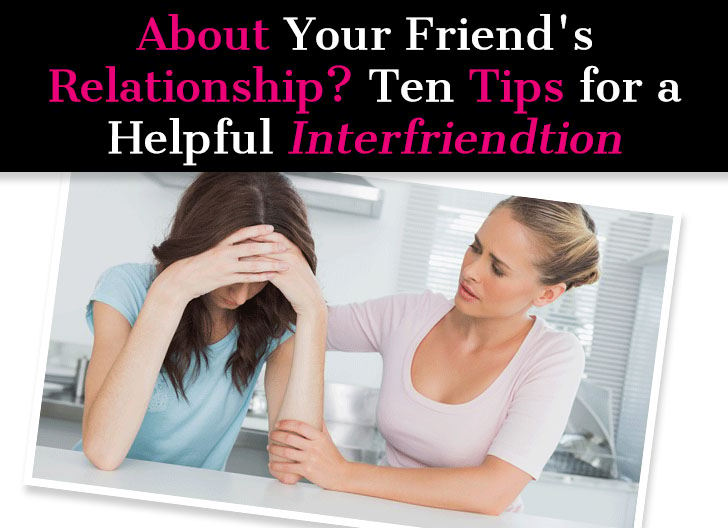So your friend is dating this guy and you’re thinking he’s bad news. It’s the kind of situation where you can feel stuck: On the one hand, you love your friend and want her to be in a healthy relationship. On the other hand, you know that if you say something to her, she may not take it well and it may ruin your friendship. What’s a girl to do?
Every situation is different, but here are some points that may apply to your situation and can be helpful to explore as you figure out the next right step:
1. Explore your motives. One of the challenges that can arise in friendship is that you tend to get close to people who want similar things as you…but rarely does everyone get the relationship they want at the same time as their close friends. Consequently, being a good friend means finding the space to be happy for your friend’s love life even though you’re feeling frustrated about your own status. This can be challenging for some, but many people aren’t even conscious of it. Thus, when considering your feelings about your friend’s relationship, make sure your own insecurities and frustrations with your love life aren’t being played out and that your concern is really coming from an authentic, caring place — not mere jealousy or any other “beef.”
2. Examine your responsibility. Odds are, you wouldn’t question whether it’s your place to tell a friend she has lipstick on her teeth or that her tag is showing, but it can be a challenge ascertaining whether you are responsible for voicing concerns about your friend’s love life. It’s tricky; we live in a ‘none-of-your-business’ culture, yet we buy things online because a hundred strangers recommended it. It’s a fine line, and there’s no blanket statement since every situation is different.
That being said, if your friendship is the kind where you’re there for each other and look out for one another, sharing concerns with your friend would fall under the category of “I got your back.” Ask yourself, if you were in her situation, would you want a friend to say something? Your preference may not be the same as hers, but it’s always good to flip it around theoretically.
3. Honor the good parts. As an outsider, you may see the situation in a very cut-and-dried, he’s-so-bad-for-her kind of way. But remember that relationships are complex and there is only so much you can see as an outsider looking in. As unhealthy as you may think things are, keep in mind that the relationship is probably filling something for her.
Maybe he makes her feel really good about herself. Maybe she’s happy to just be back in the dating game, even if this guy doesn’t seem like husband material. Maybe he’s really different than the guys she usually dates and she’s experimenting with stepping out of her comfort zone. That doesn’t mean there aren’t legitimate concerns, but recognize that while you’re focused on what this relationship does to her, she probably sees more of what the relationship does for her.
MORE: The Key Difference Between Healthy and Unhealthy Relationships
4. Concretize the concerns. The oft-used line, “I don’t see it” doesn’t say much except that you personally don’t approve of the idea. When someone tells you they don’t “see it,” your defensive reaction will probably be something like, “Well, you don’t really know him/me that well,” and you’ll be inclined to tune out the naysayer.
Remember that your “deal breakers” may be different than hers. Before you approach her, figure out what is concerning about the relationship: Is he dishonest? Does she seem depressed all the time? How’s her self-care? Is she being used, but in total denial? Has her personality been hijacked? Does it seem like she’s waiting for a change that is highly unrealistic? Get specific about it in your own head before formulating it out loud to her.
5. Don’t prosecute. The perspective you come in plays a significant role in how you express yourself. If you come off as a federal prosecutor indicting her partner, she’s probably going to go into defense mode. But if you come from a place of love and want to check in that she’s aware, okay, and able to turn to you, it sets a totally different tone. Remember that when you bash the guy she’s with, you’re not just bashing him, you’re also putting down her decision-making abilities.
Moreover, women tend to vent to their friends about the negative aspects of their partner (they save the bragging for social media), so you may have a myopic view of her partner because you’re hearing more about the shortcomings, rather than the strengths.
MORE: How Gratitude Can Save Your Relationships
6. Avoid apocalyptic talk. Sometimes out of well-meaning intentions, people warn a friend about a guy by laying out the worst-case scenario. While the worst-case scenario may be realistic, it’s important to keep in mind that you and your friend are seeing the guy from extremely different angles. Out of the excitement for a new relationship, or just plain optimism, some women tend to see prospective partners for their potential (he could be a really successful professional if he stopped talking constantly to his mom and his ex-girlfriend…hopefully this will work itself out when we get more serious), versus the actuality (he is not successful professionally and seems to be extraordinarily involved with his mom and ex-girlfriend…there is A LOT here that needs to change for this to work. Am I up for that?).
As a friend, odds are you’re seeing the guy for the actuality and your friend is seeing the potential, which means that you need to find the delicate dance of validating her virtue of hope yet insuring she’s keeping her eye on the rational piece as well.
7. Plan carefully. Setting up a Dr. Phil-style intervention probably won’t go as smoothly in real life as it does on-air. The more dramatic an intervention, the more you risk not only having your concerns fall on deaf ears, but your friendship getting damaged big time. Don’t ambush your friend with a surprise party of a 4-against-1 ratio of well-meaning friends who are all here “because we love you and want what’s best.”
If she feels like she is being cornered by a tribunal, it will be difficult for her to hear what you have to say at all, let alone consider it wisely. The one friend who broaches the topic should be someone who can calmly and lovingly share the concerns and be a shoulder to lean on. Less is more.
8. Ask permission. Don’t jump into a rant. Open with something along the lines of, “I have some concerns, would like to hear them?” Give her the option of whether she would like the conversation to proceed. For all you know, she’s been thinking about ending things anyway. Or maybe she has been feeling ambivalent and genuinely wants to hear you take on it. Or she doesn’t. Stay away from “we, your friends…” language.
Hearing that her committee has been convening behind her back and having trash-fests about her love life may make her feel betrayed and angry and certainly not inclined to hear what you have to say.
9. Surrender the outcome. Once you’ve said your piece, turn over the results. She may react in a variety of ways: she may agree with you, she may argue with you, or she may insist she knows what she’s doing and you have no idea what you’re talking about. She may thank you for sharing your thoughts, or she may tell you to mind your own business. Be willing to be wrong. At the end of the day, if you’re doing it for the right reason—because you care and want to make sure she’s seeing the whole picture—you’ll remind yourself that your goal isn’t to be right, but to be helpful. If your grim prognosis of the relationship turns out to be accurate, try to steer clear of “I told you so.”
People learn from their experiences and most people don’t like having their past—especially mistakes learned the hard way—thrown in their face.
10. Respect the fear of change. When you’re in a relationship, even if it’s unhealthy or incompatible, the jump between knowing in your gut it’s not going to work and being ready for the subsequent changes can be a scary leap. Some look back on unhealthy relationships and say that they knew in their gut that something didn’t feel right but it took a while to admit it to themselves, let alone consider walking away. Sometimes the role of a caring friend is not about telling you something you didn’t know, but giving you the safe space to connect with what you may already know deep down but have been struggling to accept because of the fear of what it will mean for your future. Thus, when you’re sharing your concerns with a friend, keep in mind that you’re not just suggesting she walk away from the relationship; in today’s world, breakups often entail a whole life-restructuring process. It’s not so simple.
MORE: 5 Signs He’s Not the One
—-
Rachel Hercman, LCSW is an individual/couple psychotherapist, writer, and lecturer specializing in relationship issues, sexual functioning, and women’s wellness. She is based in New York City and is on staff at the Medical Center for Female Sexuality.













